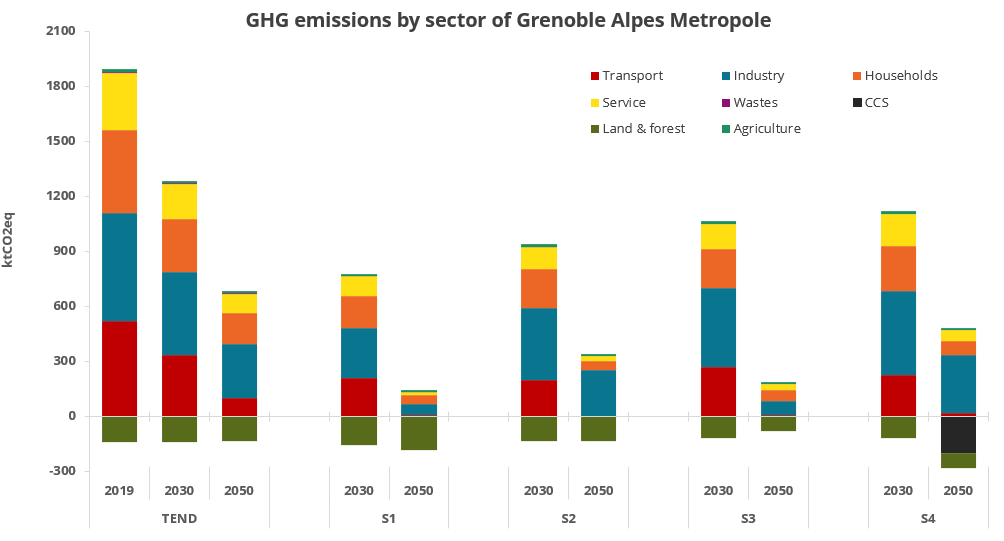In 2021, Grenoble Alpes Métropole (GAM) selected Enerdata to support the definition of its decarbonisation strategy.
The first part of the study involved localising the national scenarios outlined in "Transition(s) 2050. Decide now. Act 4 climate" by ADEME.
Enerdata thus adapted the four trajectories of ADEME to suit the agglomeration's scale. These four scenarios offered various perspectives on how Grenoble could achieve its energy transition by 2050: ranging from a low-demand scenario centred on sufficiency measures to a very technologically advanced version of the transition. This work has enabled the metropole to benefit from a complete and comprehensive understanding of the challenges and opportunities of a net zero pathway. Within this project, specific considerations have been meticulously studied, such as the transformation of short-distance mobility, expansion of district networks, renovation of public buildings, and local in wood resources.
The second phase of the project started at the beginning of this year. The objective is to formulate a final scenario including the outcomes from the initial part, the inputs from the local climate citizens assembly, and the political ambition of the Metropolis. This phase will continue until the end of the year and will serve as the foundation to update the formal targets of GAM in terms of GHG emissions and renewable energy production for the next 15 years.

16 December 2021
Grenoble Alpes Métropole has selected Enerdata to support the definition of its decarbonisation strategy. The first part of the study focuses on the territorialisation of the national scenarios "Transition(s) 2050. Choose now. Acting for the climate" by ADEME, to which Enerdata contributed (see Carbon neutrality scenarios for ADEME). The Metropolis' project aims to adapt these trajectories to the scale of the agglomeration and to study specific issues: transformation of short-distance mobility, growth of heating networks, renovation of public buildings, food, and more.
These local scenarios will then enable a discussion framework to be defined for elected officials to guide them and prioritise their political proposals and decisions. They will also be presented to the local citizens' convention that will be set up at the beginning of 2022 in order to help the Metropolis to appreciate the extent of the transformations needed on the territory and to open up debates on the proposals.
Pierre Verri, Vice-President of Grenoble-Alpes Métropole in charge of air, energy and climate, believes that "the Grenoble basin has a tradition of being at the cutting edge in terms of ecological transition, and our territory’s challenge is to maintain our exemplary position to implement carbon neutrality in 2050 on our own scale, in the same spirit as the Paris Agreement. We thus wish to explore the ways of a differentiated and locally determined contribution, by using the scenarios that ADEME has just published and by involving numerous stakeholders in this work."
Enerdata and its partners will accompany Grenoble-Alpes Métropole until January 2023 to model the impacts of the policies resulting from the convention's reflections and those of the elected officials, and to define coherent options with a goal of carbon neutrality by 2050.
Enerdata leads this project, with Solagro, I4CE and many sectoral experts (Patrick Criqui, Stéphane La Branche, Magali Talandier...).
Pascal Charriau, CEO of Enerdata, says: "We are very happy to have been selected to help Grenoble-Alpes Métropole with this ambitious and innovative project and to carry out this mission with high-quality partners. This type of approach is essential to clarify the ambitions and areas of progress of the Metropolis and should be extended in the future to other local authorities in France and abroad."
 Energy and Climate Databases
Energy and Climate Databases Market Analysis
Market Analysis